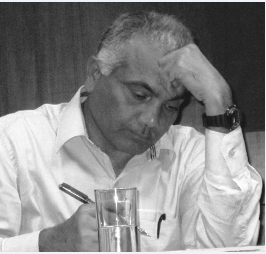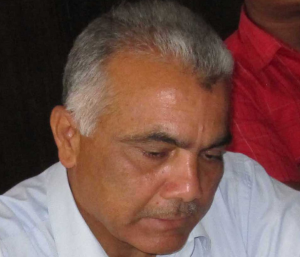Dev Raj Dahal
Senior Political Scientist, Nepal

Globalization is breaking the boundaries of disciplinary knowledge such as economics, political science, sociology, culture, literature, etc and the structure of society based on social, economic and gender division of labor. It is also compelling human beings to think in an inter-subjective perspective. The current crisis in the world is the reflection of the profound crisis in knowledge management and the ways of life and cannot be resolved by measures of the past on which the institutional mechanism of prevailing governance is based.
It is, therefore, vital to glean sound understanding of the evolving normative values and order to help human beings face the future with greater confidence.
Why civil society?
The post-cold war order has made governance polycentric where neither “order,” “security,” “development” and “peace” are the sole prerogative of the state nor is conflict exclusively confined to the inter-state domain. With the transfer of sovereignty from the mono-centric governance of the past to disparate groups of citizens organized into various institutions, such as the state, the market and a myriad of voluntary associations, networks and movements that constitute the civil society, governance has become a process of redistribution of power among them. In other words, the responsibilities of civil societies have increased in policy making, advocacy, mediation of power and the management of distributional conflicts.
Now, the state no longer monopolizes the security function. It has to share its responsibilities with the public, private and voluntary civic associations, even for its own self-defense.
This requires the civil society organizations to act maturely and in a responsible manner. This actor transformation has also led to the transformation of issues. New issues such as ecology, gender justice, human security, controlling terrorism and peace have broadened the concept of security. The domain of politics has also marked a shift from “high politics”– war, security, diplomacy, power, influence and foreign policy to “low politics” that deals with the conditions of daily life–such as basic needs, identity, social movements, democracy, human rights, good governance, cultural interactions, etc. Participation rules have also marked a shift from a top-down to a bottom-up process.
The linkages of civil societies across national borders have grown exponentially along with the post-national constellation of the state and market forces. The growing shift in basic conditions, actors, rules, issues and processes have rendered the logic of collective action heterogeneous. Still, foreign and defense policies are the prerogative of the national state and it will continue to retain considerable authority and legitimacy over them. Civil society organizations, on the other hand, will have to recognize this legitimacy even while they take up the responsibility that is their due. This is an area that needs tact and wisdom in tackling.
Basic questions:
The most frequently asked questions are related to this thin line. In this shifting paradigm, how is it possible to reconcile the “social interest” concern of civil society with the “national interest” concern of the state? Should civil societies take national interest as the collective expression of the democratic process or just remain rights-oriented and self-justifying bodies? How can the sectoral “social action” of the civil society contribute to the larger strategic “public action” of the state for the promotion of collective goods, such as security, order, peace, rule of law and welfare? How do they derive their legitimacy and become responsible to local, national, regional and global interests? More relevantly, do civil societies have the political will to build a coalition and effect a coordinated response for conflict prevention and conflict transformation?
Regional concerns:
South Asia presents an example of complex, multi-polar and hierarchical conflicts. These conflicts invariably crop up along five basic patterns—interstate conflicts; ideological conflicts; democratic shortfalls causing governance ineffectiveness, distributional struggle, and authority and legitimacy conflicts; identity conflicts stemming from positional differences of actors; and sub-national conflicts (for national self-determination) affecting the state and inter-state relations. In all the South Asian states, democracy has come to mean majority rule at the cost of a wider popular sovereignty.
Democratic deficits have thus evoked popular revulsion among minorities and weaker sections of the society. There is a basic disjunction between the state system based on a legitimate monopoly of power and political aspirations of citizens to share this power to address the growing sense of fear, powerlessness, inequality, injustice and discrimination.
Regional civil societies have been demanding a strategic shift from the subordination and conformity of diverse citizens to the state’s sovereignty to a negotiated social contract and are demanding that the states reflect the collective will of all sections of citizens. The formation of collective will is essential to nurture citizens’ identification with the state, perception of belonging, opportunities for common projects and a shared future. The failure of mono-centric governance (state) to cope with new conflict issues caused by the pluralization, regionalization and globalization of the political economy disconnects citizens from nationality.
As a result of disharmony between the state and society (and or economy), human rights struggle of citizens for liberation, entitlements and social opportunities largely remain unfinished. The politics of civil society in the region, therefore, involves the contestation of subjugation of citizens, creation of a rational ordering of the monopoly of power over society, socializing the citizens towards democratic principles, means and solidarity for a peaceful transformation of the public space. Regional civil societies are also trying to reshape the growing shift in the medium of power, from the political to the economic and technological, and pressing for a common political space for the fundamental politicization of collective decision-making. Political ethics needs to be reformulated to achieve human governance at all levels of society from individual to the world and connect purpose with values.
Post-State Identity:
South Asian civil societies lack a strong regional consciousness and collective identity due to the domination of elites who believe in national assertiveness. The incipient regional identity upheld by South Asian civil societies, especially those specializing on human rights, environment, trade unions and women mirrors their perception and adoption of state-centric policies. Economic societies of the region are better organized and have evolved a cooperative strategy of long-term rationality. But, their roles across the region are glued by pre-state economic needs for capital, labor, infrastructure development, and transport and civilization imperatives than post-state democratic needs— such as human security, environment preservation, social justice and conflict resolution. As a result, obligations, interaction and information sharing among civil societies across national boundaries remain non-conceptualized.
The soft-state nature of South Asia renders its ties with the society very weak as the states depend on the fragile consent of citizens. The states, on their part, consider civil societies fragmented, sectoral, egoistical and competing with each other for donors’ favor. The challenge for South Asian leaders is to remove the disjuncture between the states’ need for security and stability and civil societies’ demand for greater democratization to minimize the private ambition of leaderships to stick to power life-long. The propensity of the states, the markets and civil societies to construct often dissimilar, interest-bound knowledge, goals and means have yet to be synthesized to set the links between ideas and policy outcomes. Similarly, these actors should be properly coordinated so that they can work together for the common good of citizens of the region. Coexistence and collective action have to be stabilized by means of pursuing commonly acceptable democratic and development policies for regional governance.
Peace Building:
Common fear of insecurity and common problems faced by South Asian citizens demand a collective rationality of public good that binds the civil society by shared values rather than exclusive self-interests. Democratic peace requires equality before the law and, therefore, adjudication of conflict should be based on the merits of the case rather than the strength and bargaining position of powerful actors. Because of their non-hierarchical networks of organization and communication, civil society actors can play a special role in seeking a lasting solution of violent conflict by means of integrating the interests of diverse stakeholders of the society and creating a legitimate space which underpins social and cultural transformation. The role of the civil society lies in communication, mediation and coordination of demands, payoffs and actions of conflicting parties. Only collective rationality can transform violent conflict into durable peace. Conflict resolution in the divided societies of the region requires a rational perspective on the part of each group so that each includes the perspective of others to reach an understanding, consensus and social contract and learns to think as a member of the South Asian community.
The remarkable proliferation of civil societies and social movements in South Asia emerged in response to the national and global social crisis.
They are pressurizing the regional states towards the conceptualization of the new security perception, the “human” security perception that can transcend the traditional security dichotomy— between regime and nation and achieve a reflective equilibrium based on their reciprocity. Contrary to the political realist’s overriding concern to replace the ‘state of nature’ by “the reasons of the state,” civil societies tend to project societal interests into political power by enforcing transparency and accountability in the latter in its dealing with human needs and freedoms. Negotiating a new social contract requires a new mode of conflict resolution that is not imperial, muscular and hegemonic, but genuinely democratic. It should be equally counter-hegemonic, especially with regard to the neo-liberal global order, and transformatory in nature.

Peace movements of civil societies in South Asia have a manifest desire to end insurgency and counter-insurgency operations in the region. Adherents to these movements have been mobilizing public opinion and opposition political parties, religious societies, school children and volunteers, mustering strong popular support among the victims of conflicts to turn the region into a peaceful community. These movements have laid the foundation for a region wide opposition against direct, structural and latent violence and mainstreamed conflict sensitivity and peace building into a range of civil society actors.
Conclusion:
Inter-societal, inter-state and inter-people cooperation facilitated by regional civil societies has generated hopes for the institutionalization of democratic peace. Integrated and coordinated studies and response of civil societies to the conflicting parties have amply demonstrated the costs of conflict and the benefits of peace. It is, however, important to synthesize the various types of disciplinary knowledge and perception produced by the states, the markets and civil societies and prepare a common ground for addressing the root causes of the conflicts in the region. The sphere of civil societies is located in the opinion forming and early warning and response system. In this sphere, community life, experiences, grievances and needs are articulated and conflicts are mediated and resolved through communication and negotiation.
South Asian civil societies have been instrumental in protecting openness for social groups, associations and networks for competing needs, aspirations, opinions and representation of the diversity of voices. And, basic constitutional guarantees of a public sphere also provided the space for the radicalization of rights and transformation of people into public. The lines of convergence between societal self-organization and the organization of state power are, however, still significant enough to enable the political class to convince the society of its aims and create harmony between themselves for a peaceful South Asian public order.
End text.
# our contact email address is: editor.telegraphnepal@gmail.com
